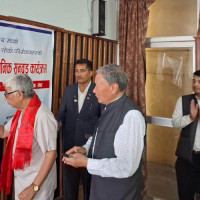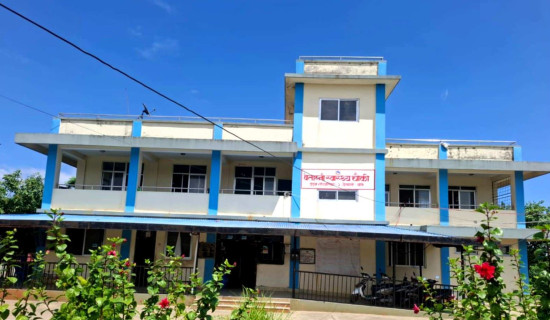- Tuesday, 1 July 2025
Mountain Ecology In The Spotlight
The stage is almost set for the Sagarmatha Sambaad scheduled to be held in Kathmandu from May 16 to 18. The multi-stakeholder dialogue forum is the first of its kind being hosted by Nepal. With the theme of ‘Climate Change, Mountains and the Future of Humanity’, the flagship platform aims to deliberate the most outstanding issues of national, regional and global importance and suggest measures to tackle them. Through this platform, Nepal intends to bring heads of state/government, lawmakers, climate scientists, experts, researchers, policymakers, representatives of local governments, intergovernmental organisations and multilateral organisations like the United Nations (UN), the private sector, civil society, and academicians and think tanks together.
There will also be participation of the communities affected by climate change, mountaineers, youths, women and media in the gathering. The participants will share their ideas and experiences on such significant matters and look for ways to enhance cooperation and collaboration among the key stakeholders to deal with this challenge. The Ministry of Foreign Affairs (MoFA) has been entrusted with the responsibility of making necessary preparations for the dialogue forum. The MoFA is coordinating with different stakeholders at home and abroad to make the much-anticipated event a success. As estimated, 300 international delegates from about 100 countries from across the world are expected to attend the three-day conference.
Burning issues
As a Himalayan nation, Nepal deserves to take the lead among mountainous countries and highlight numerous burning issues like rapid climate change in the mountain region and its adverse impacts on the environment. Using this permanent diplomatic forum, Nepal aims to apprise the global community of the climate change-related problems facing the country and seek support and cooperation for their mitigation.
In December 2009, the erstwhile government held its Cabinet meeting at Kala Patthar (5,644m) of the Khumbu Region to highlight the increasing impact of climate change on the mountain ecology. The place is close to Everest Base Camp. In 2019, the government planned to hold the first edition of the discourse forum in March 2020 to discuss several issues, ranging from climate change, climate justice, to its adverse effects on the lives and livelihoods of the people. But the government was forced to call off the gathering owing to the outbreak of COVID-19. However, it is commendable that the government has decided to organise the event.
Many nations from around the world have created regional and global platforms to raise different critical issues. Switzerland’s Davos hosts the World Economic Forum while India’s New Delhi organises the Raisina Dialogue. Nepal seems to have been inspired by those initiatives to develop her own forum to discuss the pertinent issue of the worsening climate crisis in the mountain region. As the now-melting process in the Himalayas appears to have been going on at an alarming pace in recent decades, Nepal’s initiative to host such an important conference may help boost the country’s image in the international arena.
Snow is the key source of water resources and the environment. But, global warming and resultant climate change have been threatening the country’s snow-clad mountains and glaciers. The Snow Report-2025, which was published by the International Centre for Integrated Mountain Development (ICIMOD) recently, shows that the Hindu Kush Himalayas (HKH) experienced its third consecutive below-normal snow year in 2025. This sounds the alarm for a large number of people. Similarly, it’s another study indicates that the glaciers in the HKH are retreating fast with the acceleration of the effects of climate change. According to the report, between 1977 and 2010, Nepal lost almost a fourth of its glacier areas, and glacier losses are projected to continue worldwide as temperatures continue to rise.
Since Nepal has incurred an unprecedented loss due to the climate crisis, the government wants to make the country’s voice about climate change and climate justice louder in the global forums. The government also plans to lobby for climate justice more effectively because the country has been bound to reel from problems even when it has not contributed much to climate change. It may be recalled here that Nepal has already drawn serious attention of the International Court of Justice (ICJ) towards the rising impacts of climate change on the lives of its people and sought climate justice for lessening the victims’ distress. The country has also been raising the issue related to the degrading mountain environment at the Conferences of the Parties (COP).
Priority
Nepal’s initiative to protect the mountain environment is commendable. As the country has raised a very genuine issue, all the delegates are expected to show their seriousness and deliberate on the matter accordingly. The dialogue forum’s initial meeting must create much hope and optimism in all the mountain countries that their agenda will be endorsed unanimously. As the UN accords top priority to climate change, the global body is anticipated to take the matter of mountain ecology seriously and work together with all countries, especially the affluent ones, to tackle the problem.
The rich nations must reduce greenhouse gas emissions considerably to save our planet. Since such countries are the major contributors to climate change, they must feel that it is their responsibility to extend support to addressing the vulnerabilities of mountain countries, including Nepal. These vulnerable countries must not bear the brunt of climate change unreasonably.
(The author is a former deputy executive editor of this daily.)

















